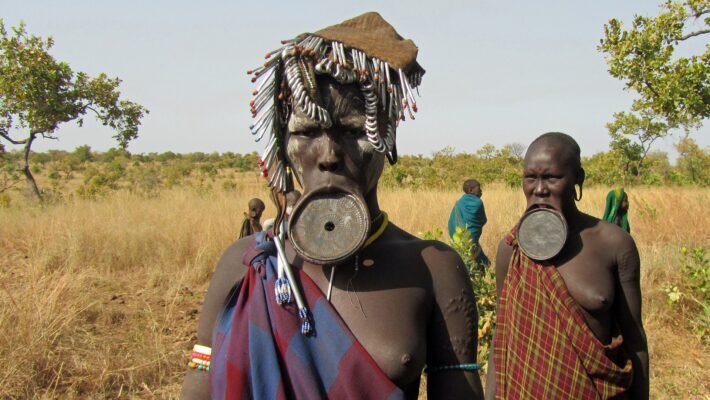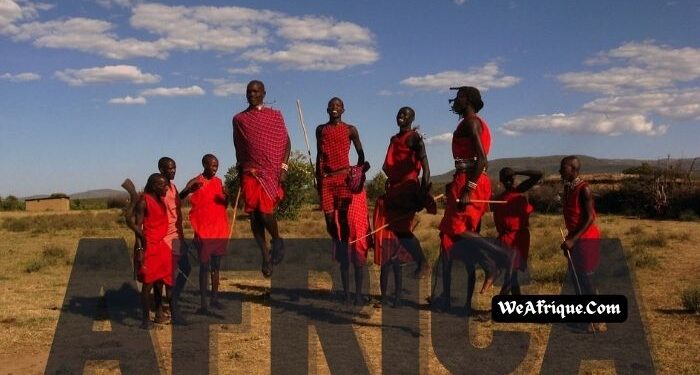There are African cultural practices that one would consider absurd, but to us Africans, it is the basis of our identity and cultural pride. These practices range from wife stealing to potency tests and lip stretching.
Although some of these practices are no longer practiced today, they still remain relevant in the African Story. Expect to be wowed while we take a look at some of these African cultural practices.
20 Shocking African Cultural Practices
1. Spit Greeting – Maasai Tribe
The Maasai people of Kenya and Tanzania spit as a way of greeting. Also when a baby is born, it is customary for the men to spit on the newborn and declare him bad. This practice is said to ward off evil spirits from the child.
Additionally, the Maasai warrior, spit on the palms before shaking the hand of an elder. Talk about utilizing spit.
2. Festival of the Dead – Chewa Tribe
In the Chewa community of Malawi, It is customary for the body of the dead to be washed during the burial ceremony. This is done by slitting open the throat of the deceased and pouring water through the insides as a way of cleaning the deceased. The water is then flushed out and used to prepare a meal for the community.
3. Potency Test – Banyankole Tribe
The Banyankole tribe of Uganda has a rather strange tradition when it comes to marriages. It is expected that the Bride’s Aunt has to have sex with the groom to test his potency. She also tests the bride’s virginity before allowing her to consummate the marriage.
In some cases, the aunt will watch the new couple have sex to prove that the man is potent.
4. Bull Jumping – Hamer Tribe
In the Hamer community of Ethiopia, young boys have to undergo a certain ritual that involves jumping across the backs of several bulls arranged in a straight and closely knit herd, pulled by the tail, and horns by older men.
This exercise is done to prove the transition from boyhood to manhood and they do it stark naked.
5. Beating for Wife – Fulani Tribe
The Fulani tribe has a tradition known as “Sharo”. This tradition involves beating a prospective suitor to a pulp by older members of the community, as a way of earning a wife and respect alongside.
If a prospective suitor is not able to endure the pain, the wedding ceremony is called off.
6. Wife Stealing – Wodaabe Tribe
The Wodaabe people of Niger have a cultural practice that remains shocking to the rest of the world. It is the wife stealing. Wodaabe marriages are arranged by parents during infancy and must be between cousins of the same lineage.
The Wodaabe men are known to steal each other’s wives during the Gerewol Festival, where the men wear elaborate costumes and makeup, to dance and impress the women. The stealing is usually done undetected, especially when the current husband does not want to part with his wife.
7. Lip Stretching – Surma Tribe

The Surma tribe of southern Sudan and southwestern Ethiopia practice a rather bizarre tradition known as lip stretching. Here the young women undergo a lip stretching procedure which involves the removal of their lower teeth to accommodate a lip plate. This lip plate is increased yearly until it reaches a remarkable size.
8. Initiation to Adulthood – Xhosa Tribe
Though not peculiar to them, Ulwaluko is a traditional circumcision and initiation from childhood to adulthood. It is a cultural practice of the people of Xhosa, in South Africa.
The young men are circumcised without any form of anesthesia. They are sent to the bush, wrapped in a blanket, with minimal provisions, and left to fend for themselves for two months before they can come home.
9. The Mating Dance – Maasai Tribe
The Maasai tribe of Kenya has a traditional dance for young warriors. It is also a jumping competition. The dance is known as the “Adamu” dance, and it is usually done during the “Eunoto” ceremony, which is done to mark the transition of junior warriors to senior warriors.
The dance is a way for the young warrior to demonstrate his strength and also attract a bride to himself.
10. Osu Caste System- Igbo Tribe
The Osu caste system is a cultural practice of the Igbo people of Nigeria. It has been traced back to the time when people were offered as sacrifices to the deities. The Osu were seen as inferior and were sacrificed when the need for human sacrifice arose.
The Osu are segregated and made to live close to the marketplaces and shrines. They are not allowed to break kola at meetings, pour a libation, or even pray on behalf of a freeborn. This African cultural practice is still upheld to this day in some parts of Igboland
11. Kusasa Fumbi
This practice is common in parts of some African countries like Zambia, Malawi, Uganda, Tanzania, Mozambique, Angola, Ivory Coast, and Congo. It is an initiation rite of sexual cleansing where a woman is expected to have sex after her first period, after becoming widowed, or after an abortion, as a cleansing ritual.
Kusasa Fumbi is translated to “Brushing off the dust”, it can be interpreted as brushing off childhood and inexperience in sex by actually practicing it. A man nicknamed the Hyena, who doesn’t use any form of protection, has sexual knowledge of these girls as a rite of passage. This practice has led to a rise in cases of HIV and AIDS, among women between the ages of 15 and 49
12. Sleeping with the Dead – Luo Tribe
The Luo people of western Kenya, northern Uganda, and the Mara Region of northern Tanzania have a cultural practice that looks absurd to the rest of the world.
The Luo people have a custom that makes a widow sleep in the same room as her late husband’s corpse before the burial. It is said that the widow will have a dream of herself having sexual relations with her late husband for the last time. The dream signifies the freedom of the woman for her late husband and the freedom to remarry.
It is part of cleansing rights. However, if the woman does not have the dream, more elaborate cleansing rituals will be carried out on her.
13. Flogging of Suicide Victims – Luo Tribe
The Luo people have a weird African Cultural practice that may not make sense to the rest of the world. It is punishment for people who commit suicide. In the Luo tribe, if a person commits suicide, by hanging himself on a tree, his corpse is flogged thoroughly before it is brought down. The corpse is also buried outside the homestead in a place referred to as a “Gunda”, which is set aside for outcasts.
The act is to prevent the victim’s ghosts or roaming evil spirits from roaming back into the home and causing other people to commit suicide. Additionally, the person is buried at night and is not mourned, or else, evil spirits will haunt the mourners.
14. Sex Offering – Himba Tribe
The Himba people of northern Namibia are famous for offering sex to guests, as a way of expressing honor to the guest and fostering relationships. The practice is known as Okujepisa Omukazendu treatment.
This African cultural practice allows the wife of the house to spend the night with the visitor in their home, while the husband sleeps in a different room. In a situation where there is no extra room, the husband sleeps outside.
Similarly, the wife is entitled to give out her friends to her husband, when they come to visit.
15. Second Burial – Igbo Tribe
The Igbo people of Nigeria have a cultural practice known as the “Ikwa Ozu” where they celebrate the dead, this is known as a second burial. The ritual takes place anytime from weeks to a year after the first burial.
This is done as a rite of initiation of the dead to the group of their ancestors. Families that do not perform the rite of passage may not have certain roles in the community.
16. Breast Ironing – Cameroon
In Cameroon, Breast Ironing also known as breast flattening is a common cultural practice that cut across all ethnic groups in the country. It is believed that men in the area believe that girls from as low as the age of 9 whose breasts are developing are ripe for sex.
To avoid these sexual predators, mothers in the area monitor the growth of their daughters’ breasts and pounds them with hot objects such as stones, hammer, and pestle to slow their development. Consequently, men will find them unattractive. However, in recent times, the practice is said to reduce the chances of having breast cancer and increase milk production in lactating mothers.
17. Healing Dance – San Tribe
One of the shocking African cultural practices is the Healing dance of the San people of Namibia, Botswana, and Angola. It is also known as the Trance dance. It is one of the most important traditions of the San people.
The entire community gather around a fire, guided by healer and elders, for several hours, sometimes even overnight. They chant songs around the fire, all night until they achieve a trance-like state, which signifies having access to the spirit world. when they get to that state, they are able to walk on fire.
This dance is done not only to cure physical illness but also to expel evil forces that cause jealousy, rage, and conflict in society.
18. The Red Ochre – Himba Tribe
The Himba tribe is no stranger to this list, as they have been mentioned before. In this cultural practice, the Himba women are girls who apply a red clay mixture, known as Ojtize to their skin, in order to have a red complexion.
Otjize is a mixture of butter, lard, and red ochre paste. It is used for aesthetic purposes. It is a traditional makeup they apply every morning once they are old enough to care for their hygiene.
19. Children before Marriage – Nuer Tribe
While in some communities it is taboo for a couple to have sexual relations before marriage, for the Nuer people of South Sudan, it is a prerequisite for marriage. The Nuer people have a tradition that a woman is supposed to have birthed 2 children before the wedding is considered complete.
This is after the groom pays 20 to 40 cows to the bride’s family. If she ends up bearing just a child, the husband is free to ask for a divorce. After the divorce, he is asked to pick either the cows he paid or the custody of the child. In cases where there’s no child, he gets a refund for his cows.
See Also: The Shocking Truths And Lies About How Africa Got Its Name
20. The Contest of Fattened Men – Bodi Tribe
In a world where everyone seems to think that being skinny is trendy, the Bodi tribe of Ethiopia does not agree with this notion. This tribe holds a festival every year to celebrate fat men, it is called the Ka’el.
The festival preparations start in June. The men are selected by their different clans and kept in isolation from their families and are fattened. During the fattening period, they are fed a special diet made of cow blood and milk. They do not involve themselves in any physical work including having sexual relations.
On the day of the festival, the men leave their huts and the winner is selected based on who has the biggest belly and firmest butt. He is crowned the fat man of the year, a position that commands respect and pride.
Africa has beautiful yet strange traditions. This article has not exhausted the shocking African cultural practices, as they are inexhaustible. However, it brings to light the few that might have been hidden from the outside world. These strange but beautiful practices are what make a culture unique and different from others.





















Discussion about this post